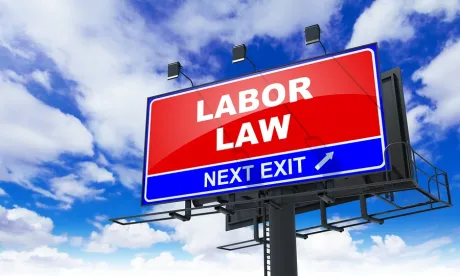In 2012, the National Labor Relations Board (NLRB) ruled that class action waivers in arbitration agreements violate employees’ rights under the National Labor Relations Act (NLRA). The U.S. Court of Appeals for the Second, Fifth, and Eighth Circuits disagreed, finding that these waivers do not violate the NLRA and are enforceable under the Federal Arbitration Act. More recently, the Seventh and Ninth Circuits sided with the NLRB on the issue. The Supreme Court will consider three cases in order to resolve this split, but any resolution could depend on the timing of the hearing. If the case is heard this term, before President Trump’s nominee for the vacancy on the Supreme Court is confirmed, it could end in a 4-4 tie. That would leave the law as it stands, and the split would continue.
This week’s stories include ...
(1) Supreme Court Will Resolve Class Action Waiver Split
Our top story: The U.S. Supreme Court takes on class action waivers. In 2012, the National Labor Relations Board (NLRB) ruled that class action waivers in arbitration agreements violate employees’ rights under the National Labor Relations Act (NLRA). The U.S. Court of Appeals for the Second, Fifth, and Eighth Circuits disagreed, finding that these waivers do not violate the NLRA and are enforceable under the Federal Arbitration Act. More recently, the Seventh and Ninth Circuits sided with the NLRB on the issue. The Supreme Court will consider three cases in order to resolve this split, but any resolution could depend on the timing of the hearing. If the case is heard this term, before President Trump’s nominee for the vacancy on the Supreme Court is confirmed, it could end in a 4-4 tie. That would leave the law as it stands, and the split would continue. John Houston Pope, from Epstein Becker Green, has more:
“Normally, if the court wants to hear a case that’s taken in January before the end of the term, it puts out a briefing schedule order that shortens the time that the rules would allow for the case to get ready. They didn’t do that in this instance, and that would suggest that they’re going to let this roll over to the next term, and they’re going to give the Trump administration an opportunity to decide whether or not it’s going to change its position on any of these issues and, therefore, perhaps change the way that the court addresses it. ... In the short term, the arbitration agreements should be reviewed to ensure that they would not be read by an employee as forbidding the ability to bring an unfair labor practice complaint charge. That is something that even the courts that have upheld arbitration agreements generally in this split have identified as being a concern squarely within the jurisdiction of the labor board to forbid that type of language.”
(2) DOL Files Suit Against Oracle
The Department of Labor (DOL) is accusing computer technology giant Oracle America of paying women and minorities less than their counterparts and of discriminatory hiring practices that favor certain Asian applicants. The suit was filed after an audit by the Office of Federal Contract Compliance Programs at Oracle’s headquarters in California, which found violations from January 2013 to the present. The DOL is seeking a court order canceling Oracle's federal contracts and requiring relief for the affected groups. Oracle claims that the suit is politically motivated.
(3) EEOC Releases FY 2016 Claims Data
Equal Employment Opportunity Commission (EEOC) claims increased for the second year in a row. The EEOC has released detailed breakdowns of the 91,503 workplace discrimination charges filed in fiscal year 2016. Retaliation charges were the most common in 2016, making up 45.9% of all charges filed. This is the first year that the agency has included statistics about LGBT charges in its summary, showing the resolution of 1,650 sex discrimination charges and the recovery of $4.4 million for LGBT individuals.
(4) Final Rule for Highly Skilled Workers Goes Into Effect
U.S. Citizenship and Immigration Services and the Department of Homeland Security have published a final rule that makes it easier to sponsor and retain skilled workers. The rule gives added job flexibility and protection to foreign workers in H-1B status or in the process of applying for a green card, and the rule adds grace periods for certain skilled workers to remain in the country while between jobs. Also, the rule expands the eligibility of certain employers for H-1B cap exemptions and clarifies how hospitals and other health care organizations can benefit from these provisions.
(5) Tip of the Week
Hakim Berry, Chief Human Resources Officer for the Northeast Region, of Tenet Healthcare, has some advice on the impact of social technology in the health care workplace:
“Employers are tackling new challenges as social media is adopted by larger portions of the workforce. Social technology can have unintended consequences, especially for health care companies required to comply with patient privacy and ethics rules. Here are some steps your organization should consider to balance employee speech and privacy: Incorporate presentations on the appropriate use of social media in the workplace into your annual training program. Use off-cycle refresher courses to ensure employees receive in-depth training beyond the annual information that is often filled with many other competencies. When an event occurs, use educational workshops to have a dialogue with the department or team, rather than simply reprimanding an individual.”




 />i
/>i

